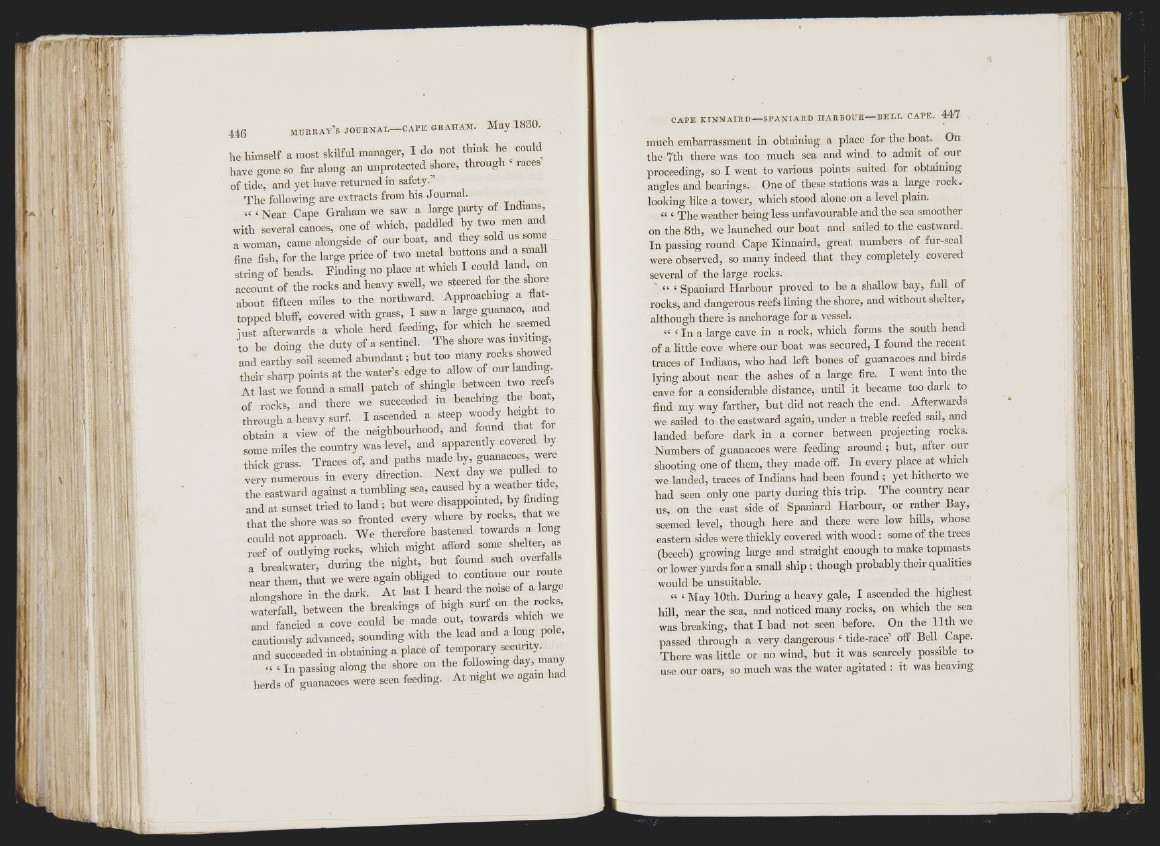
ft V *
l i l M
he himself a most skilful manager, I do not think he ^ could
have gone so far along an unprotected shore, through races
of t id l and yet have returned in safety.”
The following are extracts from his Journal.
“ ‘Near Cape Graham we saw a large party of Indians,
with several canoes, one of which, paddled by two men and
a woman, came alongside of our boat, and they
fine fish, for the large price of two metal b««®«
strino- of heads. Finding no place at which I could land, on
accoLt of the rocks and heavy swell, we steered for the shore
about fifteen miles to the northward. Approaching a fia -
topped bluff, covered with grass, I saw a large guanaco, and
jn s f afterwards a whole herd feeding, for which he seemed
to be doing the duty of a sentinel. The shore was mviti g,
and earthy soil seemed abundant; hut too many rocks showed
their sharp points at the water’s edge to allow of our landing.
At last we found a small patch of shingle between two reefs
of rocks, and there we succeeded iu beaching he boat
through a heavy surf. I ascended a steep woody height to
obtain a view of the neighbourhood, and found that f
s o m e m i l e s the country was level, and apparently covered by
hfok <u-ass. Traces of, and paths made by, guanacoes were
very numerous in every direction. Next day we pulled to
the eastward against a tumbling sea, caused by a weather tide,
aud at sunset tried to land; but were disappointed, by &dm
that the shore was so fronted every where by rocks, that we
could not approach. We therefore hastened towards a long
reef of outfying rocks, which might afford some shelter as
a breakwater, during the night, but found such overfall
near them, that we were again obliged to continue our route
alongshore in the dark. At last I heard the noise of a large
waterfall, between the breakings of high surf <m the rocks
and fancied a cove could be made out, towards which we
cautiously advanced, sounding with the lead and a long pole,
and succeeded in obtaining a place of temporary security.
“ ‘ In passing along the shore on the following day, many
herds of guartacoes were seen feeding. At mght we again had
c a p e K I N N A I R D — S P A N I A R D H A R B O U R — B E L L C A P E . 447
much embarrassment in obtaining a place for the boat. On
the 7th there was too much sea and wind to admit of our
proceeding, so I went to various points suited for obtaining
angles and bearings. One of these stations was a large rock,
looking like a tower, which stood alone on a level plain.
“ ‘ The weather being less unfavourable and the sea smoother
on the 8th, we launched our boat and sailed to the eastward.
In passing round Cape Kinnaird, great numbers of fur-seal
were observed, so many indeed that they completely covered
several of the large rocks.
“ ‘ Spaniard Harbour proved to be a shallow bay, full of
rocks, and dangerous reefs lining the shore, and without shelter,
although there is anchorage for a vessel.
“ ‘ In a large cave in a rock, which forms the south head
of a little cove where our boat was secured, I found the recent
traces of Indians, who had left bones of guanacoes and birds
lying about near the ashes of a large fire. I went into the
cave for a considerable distance, until it became too dark to
find my way farther, but did not reach the end. Afterwards
we sailed to the eastward again, under a treble reefed sail, and
landed before dark in a corner between projecting rocks.
Numbers of guanacoes were feeding around ; hut, after our
shooting one of them, they made off. In every place at which
we landed, traces of Indians had been found ; yet hitherto we
had seen only one party during this trip. The country near
us, on the east side of Spaniard Harbour, or rather Bay,
seemed level, though here and there were low hills, whose
eastern sides were thickly covered with wood: some of the trees
(beech) growing large and straight enough to make topmasts
or lower yards for a small ship; though probably their qualities
would be unsuitable.
“ ‘ May 10th. During a heavy gale, I ascended the highest
hill, near the sea, and noticed many rocks, on which the sea
was breaking, that I had not seen before. On the 11th we
passed through a very dangerous ‘ tide-race’ off Bell Cape.
There was little or no wind, but it was scarcely possible to
use our oars, so much was the water agitated : it was heaving
t